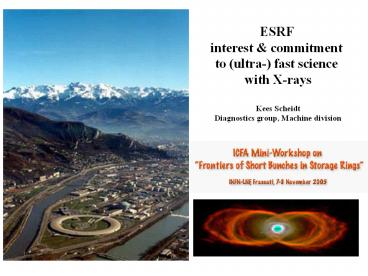ESRF - PowerPoint PPT Presentation
Title: ESRF
1
ESRF interest commitment to (ultra-) fast
science with X-rays Kees Scheidt Diagnostics
group, Machine division
2
ESRF interest commitment to (ultra-) fast
science with X-rays
- Thorough tests of the quasi-isochronous Storage
Ring in 1995 - inadequate since incompatible with
high-intensity demands - so typical bunch length remains 100ps (fwhm)
at 5mA single bunch
- Operation of various filling patterns to satisfy
the whole user - community, including specialized time-resolved
beamlines
3) Development of X-ray time resolved detector
for sub-pico second time resolved diffraction
experiments
3
(No Transcript)
4
(No Transcript)
5
ultra-fast X-ray diffraction experiments that
use the pump-probe technique with a
100femtoSec Laser light pump pulse and
a 100picoSec X-ray probe pulse
the ultimate time resolution depends on 1)
intrinsic time resolution of the Streak Camera
for X-rays 2) the quality of synchronization O
bjective 1) sub-picoSec time resolution 2)
high quality data by accumulation over many shots
6
the Streak-Tube improved version of commercial
model (Photonis)
7
(No Transcript)
8
5mm
10 picosec
9
460ps fwhm result when accumulating 900 shots
10
- Critical laser issues
- Amplitude stability
- Contrast (or pre-pulse
- energy variations)
11
(No Transcript)
12
Sensitivity for hard X-rays is low due to poor
DQE of photo-cathodes decreasing DQE
for increasing Energy best
Cesium-Iodide (100) low Potassium-Iodide
(10) Potassium-Bromide poor Gold (1)
13
- Conclusion (1)
- Optical synchronization by a GaAs photo-switch
between a - femtosec-laser and a Streak-Camera attains values
lt100fs when - Laser energy gt25uJ per pulse
- Laser stability 0.25 rms
- Laser contrast gt104
In these conditions (obtained after delicate
adjustments) the time resolution of the system
in accumulation mode is determined by the tubes
intrinsic time resolution, at 500fs fwhm for UV
light The exact time resolution for hard X-rays
was never assessed since various attempts to
produce a sub-pico sec event in an
appropriate Pump-Probe experiments were without
success.
14
- Conclusion (2)
- The accumulating Jitter-Free X-ray streak camera
- for sub-pico sec pump-probe experiments was Not a
scientific success - due to
- The difficulty of conceiving an appropriate
experiment - The required delicate adjustments on laser,
photo-switch - and streak-camera making it not user-friendly
- The particular limitations of a Streak-Tube
detector - No real space-dimension
- b) Low sensitive photo-cathode material































